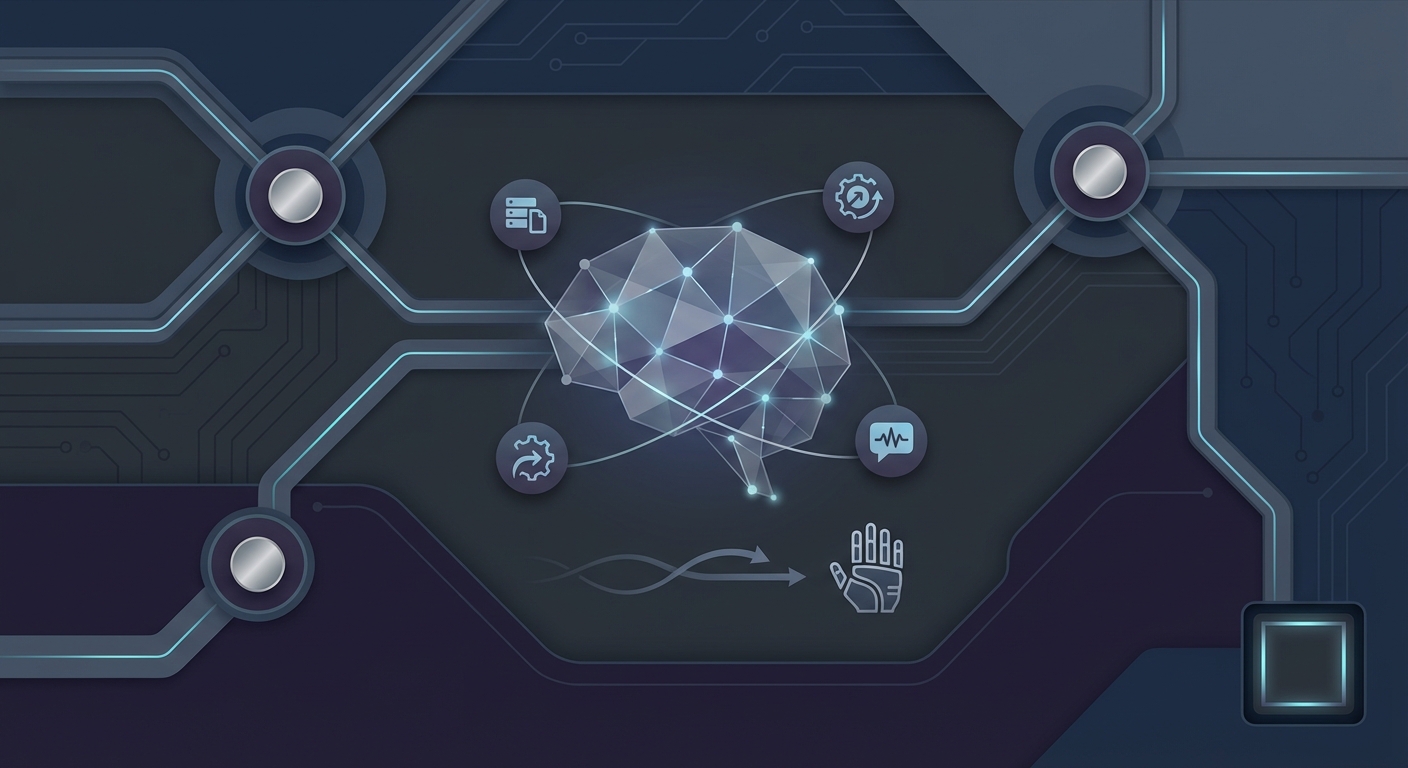AI Agent Development for Automating Business Processes
TL;DR
- This article explores how ai agent development is revolutionizing business process automation. Covering agent types, development platforms, security, and real-world applications, it provides a roadmap for marketing teams and digital transformation leaders to implement AI agents, improve efficiency, and gain a competitive edge. You'll also find insights into overcoming challenges and future trends.
Introduction: The Rise of AI Agents in Business Automation
Okay, so, picture this: you're drowning in spreadsheets, right? Then suddenly, bam! ai agents show up like tiny superheroes to rescue you from the data deluge. Are they just hype? Nope, not at all.
Think of ai agents as souped-up automation tools. They aren't just following pre-set instructions. These little dudes can actually learn, reason, and make decisions. Imagine having a digital assistant that not only schedules meetings but also figures out the best time based on everyone's calendars and projects, not just blindly throwing invites.
- For example, in healthcare, they're helping to diagnose diseases faster by analyzing medical images. (How Artificial Intelligence Is Shaping Medical Imaging Technology)
- Retail? They're personalizing shopping experiences like woah. (How top brands deliver personalized retail experiences)
- And finance? Forget about it, fraud detection is becoming lazer focused. (Interviewed on fraud prevention and AI at TIAA - LinkedIn)
A recent report showed companies implementing ai agents saw efficiency gains of up to 30%.
The cool part is, it's not just about cutting costs. It's about making smarter choices and giving customers experiences that don't feel like they were made by robots. Which, ironically, is what these agents are. Anyways, next up, we'll dive into why this is such a game changer.
Identifying Business Processes Ripe for AI Agent Automation
So, you're thinking about siccing some ai agents on your biz huh? Smart move! But where do you even start? Not every task is ripe for the picking.
- First, scope out those repetitive, rule-based tasks that are just begging to be automated. Think invoice processing or sifting through resumes. To find these, look for tasks that are done the same way every time, with clear steps.
- Next, consider data-intensive processes. Are you drowning in spreadsheets and reports? That's ai agent food right there. These are processes where lots of data needs to be analyzed or moved around.
- Also, look for bottlenecks or inefficiencies. Is there a process that always seems to be dragging? ai agents can help smooth things out. These are often the steps that slow down the whole operation.
- Finally, what about tasks needing real-time decisions? Fraud detection, maybe? These are tasks where a quick, accurate decision is crucial, and humans might be too slow.
Basically, if it feels like something a robot could do... well, it probably can! Next up, let's look at some specific examples.
AI Agent Development Platforms and Frameworks
Okay, so you wanna build some ai agents, huh? Think of these platforms like your agent's playground – it's where the magic happens. But with so many options, how do you choose?
- Dialogflow is like the smooth talker of conversational ai, perfect for whipping up chatbots that don't sound totally robotic. I mean, who wants a bot that sounds like a dial-up modem?
- Microsoft Bot Framework is your cross-platform champ. It's like the swiss army knife for bot development.
- Amazon Lex is all about voice and text, make your chatbot understand what's being said, not just what's written.
- Then you got Langchain, a framework that's all about those fancy llm-powered applications.
- And don't forget Autogpt, for when you want agents that can, like, really do their own thing.
Choosing the right platform? It's kinda like picking the right tool for the job. Up next, we'll cover the essential features to look for in these platforms.
The AI Agent Development Lifecycle: A Step-by-Step Guide
Alright, so you've got your ai agent's playground all set up – now what? Time to get these digital dudes doing something.
- First, you gotta integrate that agent with your existing systems. i'm talking crms, erps, databases, the whole shebang. Think of it like plugging in a new appliance – gotta make sure it fits the outlet, right? This step is crucial because agents need access to your business data and tools to be effective. A common challenge here is dealing with legacy systems that might not have modern APIs.
- Then, you need to keep an eye on performance. Is your agent actually doing what it's supposed to? Are there any bottlenecks or errors popping up? Monitoring tools are your friend here, seriously. This is important to ensure the agent is working as intended and to catch issues before they impact your business. A pitfall could be not setting up comprehensive monitoring from the start.
- And don't forget to implement a feedback loop. ai agents aren't perfect out of the box; they learn and get better over time. This is vital for continuous improvement and adapting to changing business needs. Without it, your agent might become outdated or less effective.
A recent article in Medium highlights that agentic ai, when applied to business process workflows, can replace fragile, static business processes with dynamic, context-aware automation systems AI Agents Are About to Blow Up the Business Process Layer.
Also, security? Super important. Make sure nobody is hacking your ai agent and turning it into a rogue bot! I mean, that's a nightmare scenario. So, what's next? Well, let's dive into defining the agent's purpose and scope.
Security and Governance Considerations for AI Agents
Okay, so, ai agents are cool and all, but are they secure? Like, really secure? It's not something you wanna overlook, trust me.
- Data privacy gotta be top of mind. ai agents slinging sensetive data? encrypt that sucker using industry-standard protocols. For example, ensure customer PII is masked or anonymized where possible.
- Authentication and authorization – only let the right agents access the right stuff. This means implementing role-based access controls so an agent designed for marketing doesn't accidentally access financial records.
- Vulnerability management is key; patch those bugs before the bad guys find 'em. Regularly scan your agent's code and dependencies for known vulnerabilities and apply patches promptly.
- And, like, what happens if there is a threat? you need threat detection and incident response plans, pronto. This could involve setting up alerts for unusual agent behavior and having a clear protocol for how to respond if a security breach is detected.
Next up? let's talk governance, so things don't go off the rails.
Real-World Examples of AI Agent Automation Success
Okay, so, you're probably wondering if ai agents actually do anything useful, right? Well, here's a few real-world examples that might surprise ya:
- A customer service chatbot, like Intercom AI, can slash support tickets by, like, 40%. It handles common queries, freeing up your human agents for the tricky stuff.
- HubSpot Breeze automates a lot of the prospecting stuff for sales teams, apparently boosting efficiency by 30%. This might involve identifying potential leads based on specific criteria or drafting initial outreach messages.
- And, Intuit Assist? It automates all those tedious finance tasks that nobody likes. This could include things like categorizing expenses or generating financial reports.
So, next up, how to keep these things from going rogue.
Overcoming Challenges in AI Agent Development and Implementation
So, you're thinking ai agents are all sunshine and rainbows? Not so fast, cause there's always gonna be a few bumps in the road! Let's talk about some of those potholes, and how to avoid 'em.
First off, lack of clear goals. Like, what exactly do you want this agent to do? "Improve efficiency" is not a goal, my friend. Get specific. Are we talking about cutting invoice processing time by 50%? Now that's a goal. Use SMART goal setting to define measurable objectives.
Then there's insufficient data. You can't train an agent on, like, three spreadsheets. It needs data. Lots of it. And it needs to be good data, not garbage. Ensure you have access to a large, diverse, and clean dataset relevant to the agent's task.
And uh oh, poor integration. Plugging your ai agent into an outdated system? Good luck with that. It's like trying to fit a usb-c into a floppy disk drive. Invest in modernizing your systems or use middleware to bridge the gap.
Resistance to change from employees is a big one. People don't like robots taking their jobs, even if that's not the intent. Make sure everyone understands what's up. Focus on how agents can augment human capabilities and communicate the benefits clearly.
Finally, underestimating the complexity... Look, ai agent development ain't a weekend project. It takes time, effort, and expertise. Don't dive in headfirst without a plan. Develop a phased approach and allocate sufficient resources.
Next up, let's chat about preventing these things from going rogue.
Future Trends in AI Agent Development
Okay, so what's next for ai agents, huh? It's not just about automating the boring stuff anymore. It's about where these things are going. And honestly, it's kinda mind-blowing.
Expect advancements in natural language processing (nlp). ai agents will, like, actually understand what you mean, not just keywords. That means less clunky interactions and more human-like convos.
Also, keep an eye on reinforcement learning. ai agents are gonna get really good at optimizing processes on their own. Imagine an agent that tweaks marketing campaigns in real-time based on customer responses, without you even lifting a finger.
Integration with edge computing is gonna be huge. ai agents running on local devices? Faster responses, less data transfer. Think real-time fraud detection at atm's.
And uh, get ready for no-code ai agent platforms. These platforms allow users to build AI agents using visual interfaces, drag-and-drop functionality, and pre-built components, meaning you don't need to write any code. As that one Youtube video shows, you can build ai agents with zero coding knowledge I built an AI Agent in 43 min to automate my workflows (Zero Coding).
So yeah, ai agents are evolving fast. and it's only gonna get wilder from here. Time to wrap things up.
Conclusion: Embracing AI Agents for a Smarter Future
So, ai agents... they're not just a flash in the pan, you know? They're kinda reshaping how we do business, and honestly, it's about time.
- Think of it like this: ai agents are turbocharging automation. It's not just about doing the same old stuff faster, it's about making smarter decisions and creating more dynamic, context-aware systems.
- Businesses that get on board now? well, they're gonna be the ones leading the charge. It's about efficiency, sure, but also about innovation and giving customers what they actually want.
- But, it ain't all sunshine and rainbows. We gotta develop these ai agents responsibly, keeping security and governance in mind. No one wants a rogue ai agent running wild, right?
Whether its customer service, sales or finance, AI agents are here to stay so it's time to start strategizing how you can leverage them for your business.





